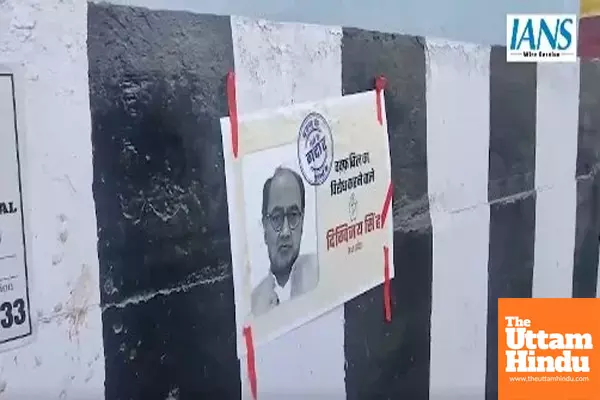
Row as posters terming Digvijaya Singh 'gaddar' come up in Bhopal and other parts of MP

Bhopal(The Uttam Hindu): Posters carrying veteran Congress leader and former Madhya Pradesh Chief Minister Digvijaya Singh's picture were put up in Bhopal and some other parts of the state have sparked a political controversy. Posters that were put up at several locations in Bhopal, mentioned that Digvijaya Singh has supported the Waqf Amendment Act. The word "gaddar" (traitor) was also used for Congress leaders along with Digvijaya Singh's picture and Congress' symbol. While on upper portion of the banners, the word "gaddar" was mentioned with a stamp, and in lower portion has a picture of Digvijaya Singh and his party's symbol, and states, "Waqf Bill ka virodh karne wale Digvijaya Singh."
Posters were removed by Congress workers soon after they noticed them, and blamed the BJP government for putting such objectionable posters of Digvijaya Singh. Similar posters were put up on roadsides and on walls in Ratlam district as well, however, they were also removed, a Congress leader told IANS on Friday. "This is a highly objectionable act from the BJP. Ratlam district Congress unit will file a complaint against BJP, and then will stage a protest also," Ratlam district Congress President, Mahendra Katiyar, said.
It came amid debate over the newly enacted Waqf Amendment Act, which saw mixed reaction from across the political parties and people from the Muslim community across the country. On Thursday, a protest against Waqf Amendment Act was organised by Congress MLA Arif Masood in Bhopal, and a large number of people from Muslim community had joined the protest. Addressing a large gathering of the people from the Muslim community, Arif Masood, who is an MLA from the Bhopal Madhya Assembly seat, said, "All India Muslim Personal Law Board (AIMPLB) has always opposed the Waqf Act and will continue to oppose it at each level."
After the Waqf Amendment Bill-2025 was passed in both the Houses of the Parliament, President Droupadi Murmu on April 5 gave her assent to it, becoming an Act, which came into effect from April 8. Over 10 petitions, including those by politicians and the AIMPLB and Jamiat Ulama-i-Hind, were filed in the Supreme Court (SC) to challenge the validity of the new law.
The petitioners have submitted that the provisions of the law discriminated against Muslims by imposing restrictions which were not part of the governance of other religious endowments. The SC bench headed by Chief Justice of India (CJI) Sanjiv Khanna is scheduled to hear the matter on April 16. The Centre has already filed a caveat in the apex court to ensure no order is passed without hearing it first.

